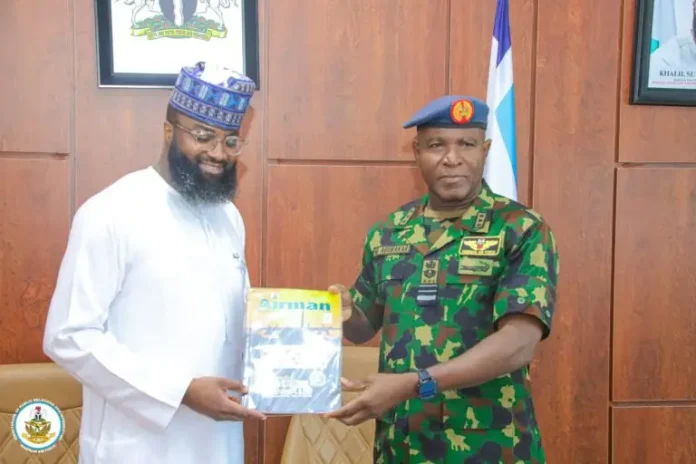News Investigators/ The Nigerian Air Force (NAF) and the National Agency for Science and Engineering Infrastructure (NASENI) have signed a renewed Memorandum of Understanding (MoU) to strengthen indigenous research, development, and innovation in defence and aerospace sectors.
This is contained in a statement by NAF, Air Commodore Ehimen Ejodame, Director, Public Relations and Information, in Abuja.
The MoU was signed on Friday during a visit by the Chief of the Air Staff (CAS), Air Marshal Hasan Abubakar, to NASENI’s Executive Vice Chairman/CEO, Mr Khalil Halilu, at the agency’s headquarters.
The visit reaffirmed their ongoing collaboration and launched broader institutional synergy in aerospace, engineering, and technology development.
Commending NASENI’s leadership under Halilu, Abubakar described the agency as “a beacon of hope for technological advancement in Nigeria.”
He stressed that technological self-reliance was crucial for a strong and responsive air force.
Highlighting key achievements, Abubakar noted NASENI’s significant role in developing the Nigerian-made C-5 aircraft rocket, including successful material analysis and upcoming parts manufacturing.
He also pointed to the establishment of the NASENI North-West Technology Innovation Hub at the Air Force Institute of Technology (AFIT) in Kaduna as a symbol of their joint progress.
“In the spirit of national interest, we invite NASENI to consider co-ownership of the C-5 Rocket Project.
“The new MoU introduces refined provisions for seamless, structured, and results-driven cooperation, covering joint research and development, human capacity building, local aerospace production, and strategic defence technology co-development.
“The partnership aligns with the Presidential priority on innovation, defence self-reliance, and indigenous capacity development under the Renewed Hope Agenda,” Abubakar said
In response, Halilu reaffirmed NASENI’s commitment to co-develop technologies supporting NAF’s operational and industrial growth.
He described the collaboration as a catalyst for Nigeria’s shift “from importation to innovation, and from consumption to creation.”
“The visit marks a significant milestone in Nigeria’s pursuit of technological sovereignty in defence, reflecting a strong commitment by both institutions to leverage science, engineering, and innovation as drivers of national strength and socio-economic development.”
NAN


